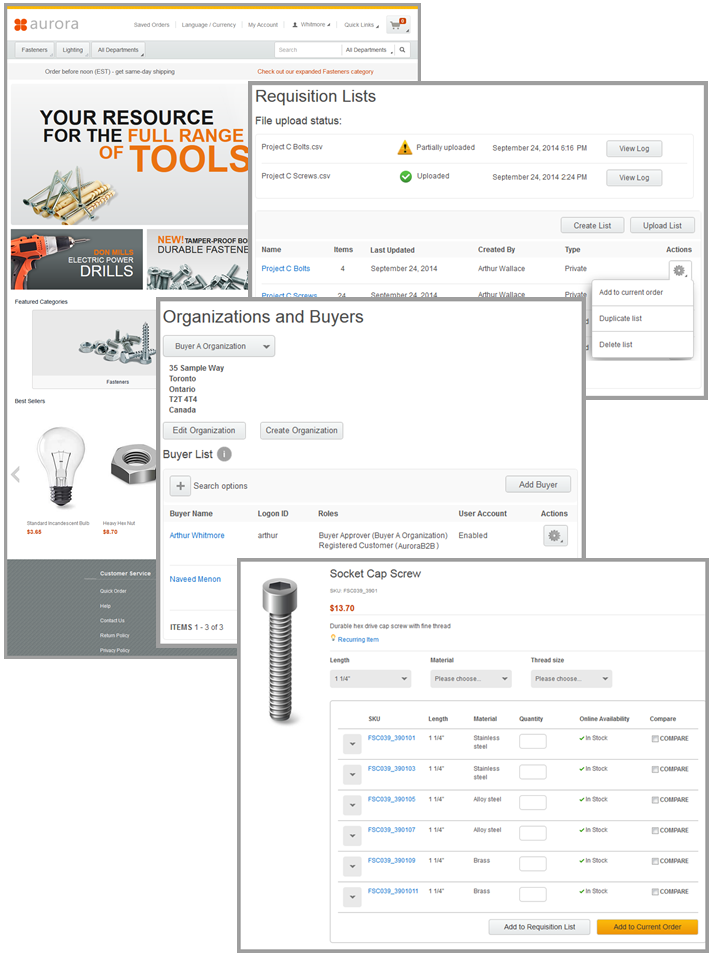
Aurora as a B2B starter store
You can publish the Aurora starter store as a B2B
store and take advantage of features that are offered by the Aurora starter
store plus extra B2B capabilities. Get your B2B e-commerce site up and running
faster at a lower cost by using the Aurora starter store as your starting point.
With B2B-optimized features built right into the storefront, you can minimize
the amount of customization that is required to provide an optimal shopping
experience to your business customers.

B2B capabilities in the storefront
The Aurora starter store offers a functionally rich customer experience with the following features that are designed for sites that sell directly to businesses:- Requisition lists, including support for uploading requisition lists
- Multiple saved orders
- B2B-optimized catalog browsing widgets
- Self-serve registration for organizations and buyers
- Self-serve buyer organization administration
- Approval support for buyer registration and orders
Buy-on-behalf-of
capability for buyer administrators- Organization and contract selection
- Contract pricing
- Product entitlement
- Guest browsing and shopping
- Support for account and contract terms on check-out pages, such as purchase orders, credit line payments, and shipping charge types
For more information about these features, see B2B-optimized features in the Aurora starter store.
Technology enhancements
B2B capabilities are incorporated into the existing Aurora starter store, rather than into a separate store. The following table summarizes some of the key enhancements:| Commerce Composer for managing pages and layouts | The catalog browsing pages and content pages in the Aurora starter store are
managed in the Commerce Composer tool, giving Management Center users unprecedented control over
page creation and design. Several B2B-optimized widgets for catalog browsing compose an extensive
Commerce Composer widget library to enhance category, product, and search results page layouts.
Other B2B-specific pages, such as the saved order pages, requisition list pages, and organization and buyer administration pages, are not managed in the Commerce Composer tool. However, the functions in the pages are provided by widgets that are arranged in templates. Both the widgets and templates are built on the Commerce Composer framework to simplify the transition to the Commerce Composer tool. |
| Responsive web design | The Commerce Composer templates and widgets follow responsive web design patterns to provide a consistent user experience on any device. By adopting the patterns that are modeled in the store, you can extend the B2B experience to all touch points. These patterns can reduce development and test times when compared to developing device-specific sites. |
| Representational State Transfer (REST) services | The Aurora starter store uses REST services extensively to facilitate the invocation of classic controller commands and the activation of data beans. The HCL Commerce REST API includes support for a wide range of store capabilities. |
| HCL Commerce Search (Solr) enhancements | The Aurora starter store is powered by HCL Commerce Search to deliver search-based catalog browsing flows that support contract-based pricing and product entitlement. For your B2B store, take advantage of recent enhancements to search capabilities, including performance improvements, search-based navigation, dynamic merchandising, and rule-based sales categories. |
Publishing the Aurora starter store as a B2B store
Certain store functions that are more typical in B2C stores are disabled by default, such as wish lists and registration fields for gender and age. However, you can enable any store function that makes sense for your B2B business, with a few exceptions (see Aurora starter store functions).Sample B2B catalog
When you publish the Aurora starter store as a B2B store, the store uses a sales catalog that contains rich sample data for hardware products. The sample data showcases key B2B-optimized capabilities in the storefront. Here are some examples:- Certain products in the Fasteners category have many defining attributes, which result in many SKUs for the product.
- Certain attributes that are used as facets for hardware products have an associated image for each value. Examples are the Head style attribute for products in the Screws category, and the Bulb style attribute for products in the Lighting category. This attribute data demonstrates how merchandisers can enhance faceted navigation by adding images to the facet values.